Aïssata Fall
Africa Director, Regional Representative for West and Central Africa

October 30, 2025
Africa Director, Regional Representative for West and Central Africa
Read in French / Lire en français.
October 17, 2025, marks an important milestone for the researchers, analysts, and policy advisors at PRB and the Consortium Régional pour la Recherche en Économie Générationnelle (CREG). On that day, the National Assembly of Benin clearly expressed its desire to better understand the care economy and other key demographic concepts in order to inform policymaking.
“Today marks the beginning of the National Assembly of Benin’s engagement with the issue of unpaid domestic care work—and, more broadly, with the care economy,” said Honorable Abdoulaye Gounou, Chair of the Foreign Relations Committee of the National Assembly. “This is the true starting point, the moment when the Assembly begins to take ownership of this important topic.”
The event, organized jointly by CREG and PRB, was held in direct response to a request from parliament and made possible by the commitment of Hon. Gounou. For PRB, it represented more than a workshop—it symbolized the recognition, by the political sphere, of the value of connecting research and public action. It was also a significant moment in our ongoing effort to make data useful, understandable, and actionable for the people shaping public policy.
What makes this meeting so remarkable is that it did not originate from a technical project, but from the political sphere itself. After a series of consultations and working sessions, members of parliament formulated a clear request: to understand the research results shared with them—not as isolated statistics, but within their broader economic and social context.
This initiative was the result of a sustained and thoughtful dialogue between researchers, technical experts, and policymakers. Over the past several years, teams from CREG and PRB have worked closely with ministries, parliamentarians, and civil society organizations to translate demographic and economic data into policy-relevant messages. Supported by the International Development Research Centre (IDRC) and the Hewlett Foundation, these exchanges helped build a common language and inspired parliament to engage in a national-level dialogue.
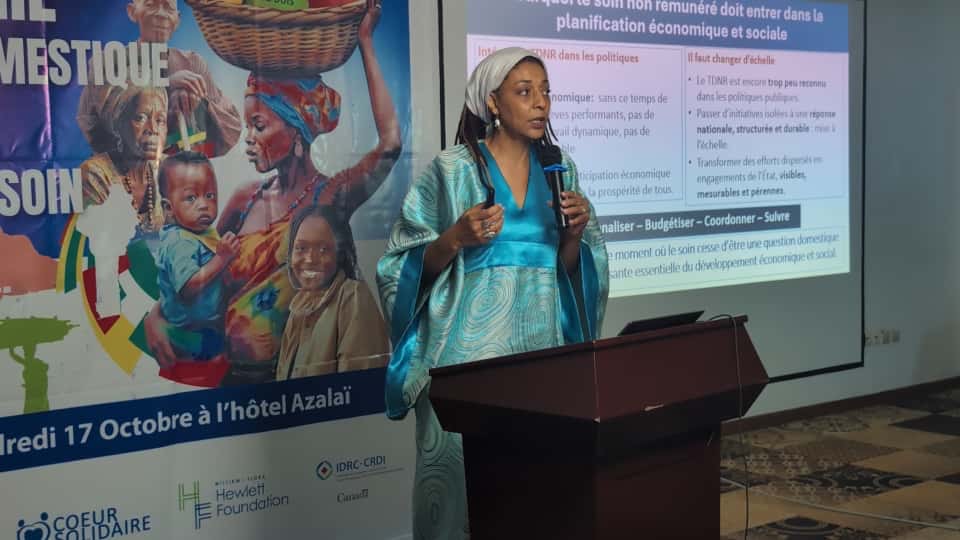
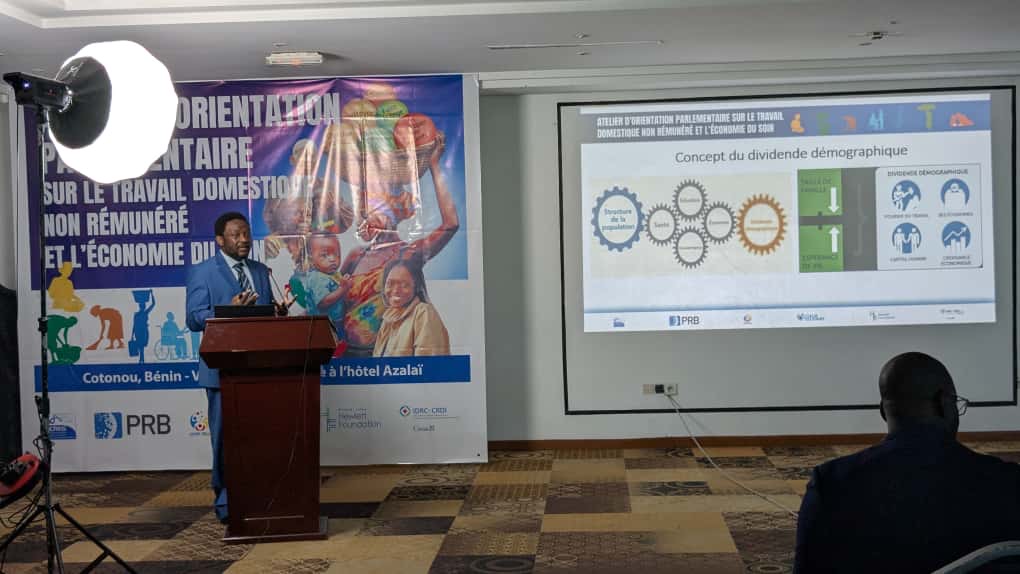
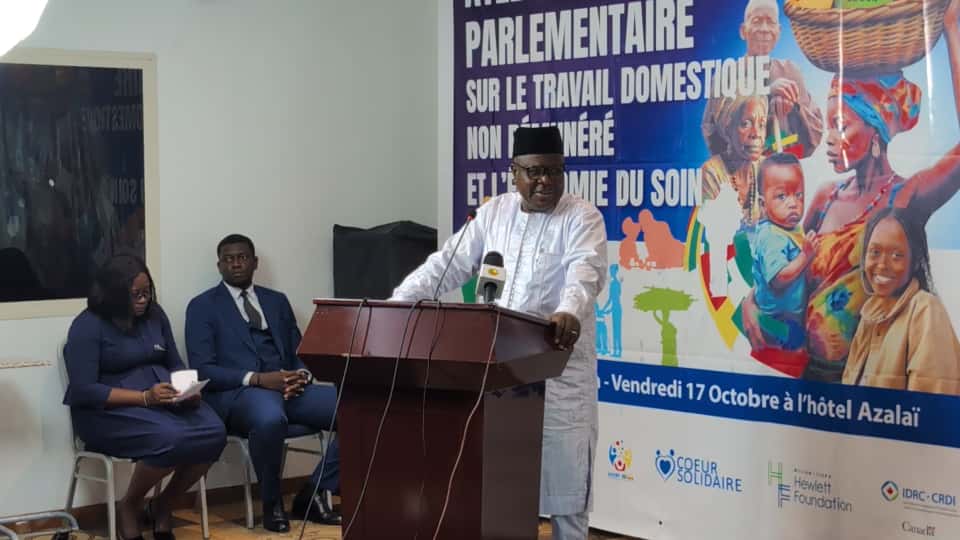
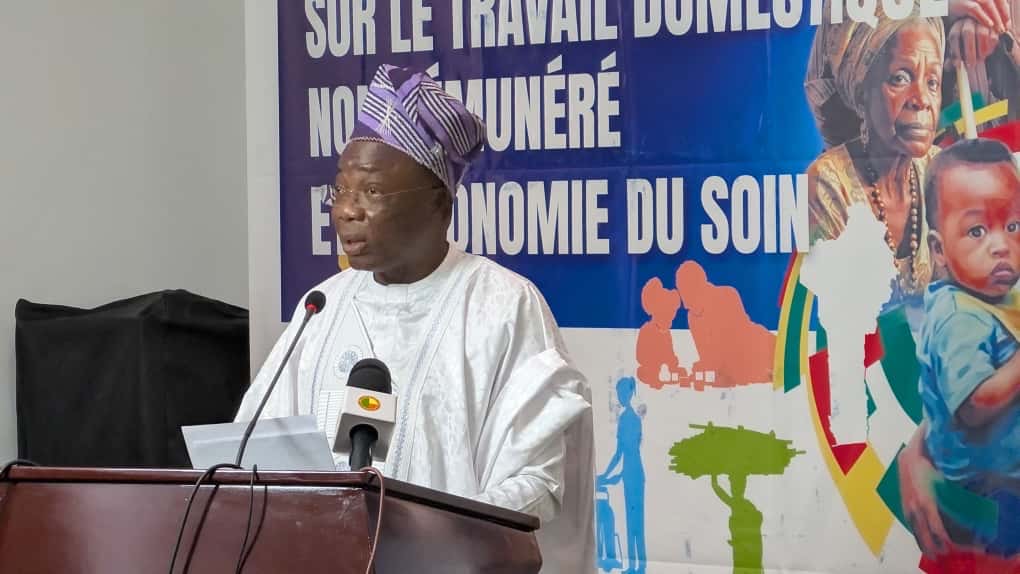
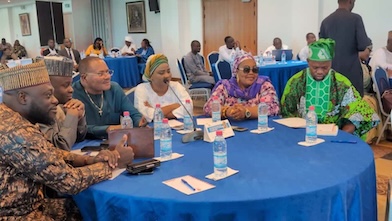
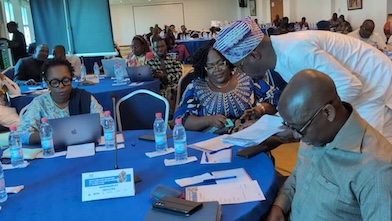
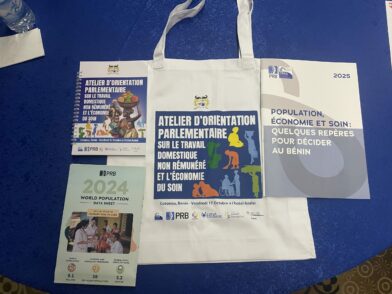

From top (left to right): (1) PRB’s Aissata Fall; (2) CREG’s Latif Dramani; (3) Hon. Gounou; (4) Honorable Mahougnon Kakpo; (5) Members of parliament; (6) Hon. Kakpo with parliamentarians; (7) PRB’s new handbook on the care economy; (8) A banner at the workshop.
The October 17 session was therefore not just a dissemination event—it was a response to a direct political demand. For the first time, research conducted by African institutions—on national transfer accounts, intergenerational dynamics, and unpaid care work — took center stage in a parliamentary debate. This event was also the culmination of a long-term effort. For nearly a decade, PRB and CREG have shared a common goal: to make research findings comprehensible, relevant, and actionable for policymaking.
In Cotonou, this vision took concrete form through the presentation of a new policy handbook, Understanding the Economy and Population. Supported financially and technically by PRB, this publication is the first of its kind. It translates complex concepts—such as demographic transition, intergenerational transfers, and the care economy—into clear, accessible language.
The handbook embodies the shared vision of PRB and CREG: to foster policy dialogue informed by data. It reflects the belief that policymakers can only truly engage with research when they have tools adapted to their context and decision rhythms. The goal is not to turn parliamentarians into technical experts, but to provide them with solid reference points for reading, questioning, and applying evidence in their deliberations.
This investment illustrates the role that PRB seeks to play: to support spaces for political dialogue while equipping those who lead them. Because understanding data is the first condition for transforming it into meaningful action.
The meeting also marked a symbolic and political turning point: unpaid care work has moved from the private sphere into the realm of national debate. The discussions helped move beyond seeing care as a private family duty or a women’s issue. Instead, it was framed as a major economic and budgetary issue, on par with growth, employment, and public health.
Recognizing the value of care means acknowledging that without the invisible labor of women and families, no economy can function sustainably. The time spent cooking, cleaning, teaching, and caregiving—often without pay—directly sustains productivity, education, and social stability.
In this sense, the parliamentary debate of October 17 gave full political meaning to the care economy. It demonstrated that this issue goes beyond gender equality—it touches on the very vision of development itself. Care is a pillar of society, a driver of social justice, and a lever for inclusive growth.
“As our society evolves, we must take into account the concerns that arise with its transformation,” remarked Honorable Edmonde Tagnonnanon Fonton. “This is the case for unpaid domestic work and the care economy.”
Benin’s experience offers a model for Francophone West Africa. It proves that a data-driven political dialogue can emerge when researchers and policymakers work together in a climate of trust. This approach — engaging national institutions, civil society, and parliament — can inspire other countries facing similar challenges. It also shows that the conversation must extend beyond technical ministries to include those who represent citizens directly.
By working with national assemblies, CREG and PRB are helping to bridge science and democracy. Parliamentarians become essential actors in transforming analysis into public policies that can improve people’s daily lives and strengthen social cohesion.
At its core, the debate in Cotonou raised a simple but profound question: what holds our societies together? Is it what we produce, or how we care for one another? Looking at development through the lens of care means understanding that economic growth, equality, and solidarity are not separate goals — they are interconnected dimensions of the same vision for society. To recognize, measure, and organize care is to value what sustains everyday life and to build the foundations of a more equitable future.
In Benin, this awareness has reached a decisive milestone: care is now recognized as a national political and economic issue. And this progress—borne of dialogue between researchers, policymakers, and citizens—gives full meaning to a simple yet powerful idea: to understand the care economy is to understand what holds our societies together—and what can transform them.
